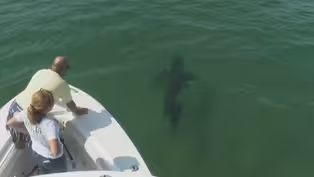
Sexual assault claims against immigration officials ignored
Clip: 7/21/2023 | 6m 33sVideo has Closed Captions
Investigation finds sexual assault claims against immigration officials routinely ignored
A new investigation by the Pulitzer Prize-winning organization Futuro Investigates and Latino USA shines a light on allegations of sexual abuse and assaults filed by migrants in U.S. immigration detention facilities. Geoff Bennett discussed more with NewsHour producer Zeba Warsi, who teamed up with Futuro Investigates and has been reporting on this story since 2021.
Problems playing video? | Closed Captioning Feedback
Problems playing video? | Closed Captioning Feedback
Major corporate funding for the PBS News Hour is provided by BDO, BNSF, Consumer Cellular, American Cruise Lines, and Raymond James. Funding for the PBS NewsHour Weekend is provided by...

Sexual assault claims against immigration officials ignored
Clip: 7/21/2023 | 6m 33sVideo has Closed Captions
A new investigation by the Pulitzer Prize-winning organization Futuro Investigates and Latino USA shines a light on allegations of sexual abuse and assaults filed by migrants in U.S. immigration detention facilities. Geoff Bennett discussed more with NewsHour producer Zeba Warsi, who teamed up with Futuro Investigates and has been reporting on this story since 2021.
Problems playing video? | Closed Captioning Feedback
How to Watch PBS News Hour
PBS News Hour is available to stream on pbs.org and the free PBS App, available on iPhone, Apple TV, Android TV, Android smartphones, Amazon Fire TV, Amazon Fire Tablet, Roku, Samsung Smart TV, and Vizio.
Providing Support for PBS.org
Learn Moreabout PBS online sponsorshipGEOFF BENNETT: Immensely invisible.
A new investigation by the Pulitzer Prize-winning organization Futuro Investigates and Latino USA shines a light on allegations of sexual abuse and assaults filed by migrants in U.S. immigration detention facilities.
"NewsHour" producer Zeba Warsi teamed up with Futuro Investigates and has been reporting on this story since 2021.
We spoke earlier this week.
Zeba, it's good to see you.
ZEBA WARSI: It's good to see you, Geoff.
Thank you for having me.
GEOFF BENNETT: So tell us about this investigation into allegations of sexual abuse filed by migrants in immigration detention facilities.
What did you find?
ZEBA WARSI: What struck me the most was the spirit of three women of color, immigrants who are held in detention centers, and how they came forward to speak about the abuse that they faced.
They spoke about sexual voyeurism, open showers.
They also talked about how they were assaulted by a medical professional while they were held in one of these facilities.
Here's an excerpt of what they have told me.
MARLISSA, Survivor: In the country, you never had to worry about voyeurism or none of that.
You never had to worry about sharing no shower and like none of that.
And then I came to Glades, and I was like, what?
You used see the shadow, the shadowing of, like, their heads.
You could see it was a male.
QUESTION: And how often did this happen?
MARLISSA: Like, every day.
They never fixed the issue.
VIVIANA, Survivor (through translator): He tells me to lower my pants and he placed the stethoscope there.
He was saying like: "Good, good."
And he's doing like strange gestures, like dirty.
He was smiling and looking at me.
I was quiet the whole time.
For a moment, I was staring off into space and thinking, my God, what is happening?
MARI, Survivor (through translator): When I was looking at myself in the mirror and battling with myself, I was thinking, I don't deserve to wear these clothes.
And I don't deserve to wear this makeup, because I don't matter.
And I felt immensely invisible.
GEOFF BENNETT: So, Zeba, what facilities in particular emerged as the problems in your investigation?
ZEBA WARSI: The last two women you just heard were held at Stewart County Detention Center in Georgia.
These women have alleged that one male nurse, the same male nurse who was supposed to look after them in the medical clinic inside the facility, assaulted them.
And these are not the only ones who've made this allegation.
There are at least three other women who made similar allegations against the same male nurse.
They complained to ICE about it.
They complained to CoreCivic, which is a private prison company that runs this particular detention facility.
It's been a year this month since they filed their public complaint, and they haven't heard anything back yet.
The other woman that we heard from was detained at Glades County detention facility in Florida.
And she experienced sexual voyeurism.
She experienced cross-gender viewing.
She also experienced harassment by the psychiatrist at that facility, another medical professional.
These women in different facilities don't really know each other.
But what they have told us is strikingly similar.
And beyond these women, at least a dozen immigrants that I have interviewed across the country who have also talked about similar patterns of assault and abuse complaints, of intrusive pat-downs, searchers, complaints of invasive touching of genitals, it also does emerge that this is not a problem which is isolated to one facility or one state.
GEOFF BENNETT: You teamed up with veteran journalist Maria Hinojosa for this investigation, and she talks about how she's been doing this reporting, looking into this problem for more than a decade.
MARIA HINOJOSA, President and Founder, Futuro Media Group: ICE has found new ways to deal with the challenges of people in detention complaining about sexual abuse.
What we were able to uncover is that one of the ways in which they're dealing with this is by transferring people, transferring migrants and refugees from one detention facility to another as a way of addressing or not addressing complaints of sexual abuse and assault in immigrant detention facilities.
GEOFF BENNETT: So your investigation found that ICE transfers detainees who make these complaints.
How does that play out?
ZEBA WARSI: Just, if you may remember, in 2021, there were headlines that came out of Irwin County Detention Center in Georgia.
That is a place where nonconsensual reproductive surgeries were conducted.
That facility have to be shut down after nationwide outrage, congressional hearings.
But what happened to the women who were detained there?
They were not released.
Most of them were transferred from Irwin to Stewart County Detention Center.
But that is the facility in Georgia where Viviana and Mari, the two women -- we have changed their names -- those two women faced alleged assault by that nurse.
Similarly, in the Florida case that we highlight, we had a woman called Melissa who was detained at Glades County Detention Center.
She filed complaints.
Other women filed complaints.
There were many other complaints of abuse apart from sexual abuse that were also raised.
ICE had to shut down that facility.
Women were transferred from Glades to Baker County Detention Center.
And, at Baker, which is the second facility, Marlissa faced similar, if not worse.
Whenever immigrants end up complaining, immigration rights activists say that this has become a consecutive pattern that ICE has adopted of transferring folks from one center to another.
GEOFF BENNETT: Well, on that point, Zeba, what's the -- what's the path forward for these women?
ZEBA WARSI: Geoff, these women are hoping to hear back on their complaints.
We followed up with the Georgia Bureau of Investigation, which is the law enforcement agency that took up the case and had promised to conduct a thorough investigation.
They said that they have concluded it, the DA's office has it.
The DA's office has not released the conclusion yet.
We have 300 complaints of sexual assault and abuse that have been filed by immigrants across different centers; 60 percent of these complaints have no update on whether an investigation was conducted.
So, the problem that we are highlighting is not only that abuse of immigrants in detention centers is taking place, the fact that it may be happening with impunity, the fact that there is a possible lack of accountability, the fact that most of these cases are not being thoroughly investigated.
And that's what we hope to change.
And that's what we hope will be the outcome of our story.
GEOFF BENNETT: Zeba Warsi, thank you so much for sharing that reporting with us.
ZEBA WARSI: Thank you for having me, Geoff.
GEOFF BENNETT: And you can read more of Zeba's work and find a link to the full podcast "Immensely Invisible" on our Web site.
That's PBS.org/NewsHour.
Capehart and Abernathy on the multiple Trump investigations
Video has Closed Captions
Clip: 7/21/2023 | 11m 9s | Capehart and Abernathy on how multiple Trump investigations affect the presidential race (11m 9s)
Christopher Nolan on the challenges of 'Oppenheimer'
Video has Closed Captions
Clip: 7/21/2023 | 7m 23s | Christopher Nolan on 'Oppenheimer' and the responsibility of technology creators (7m 23s)
Parts made by U.S. companies used to build Russian missiles
Video has Closed Captions
Clip: 7/21/2023 | 9m 33s | Parts made by U.S. companies used to build Russian cruise missiles (9m 33s)
Remembering the life and legendary career of Tony Bennett
Video has Closed Captions
Clip: 7/21/2023 | 3m 52s | Remembering the life and legendary career of Tony Bennett (3m 52s)
Shark tracking efforts ramped up after wave of encounters
Video has Closed Captions
Clip: 7/21/2023 | 6m 33s | Shark tracking efforts ramped up after wave of encounters off Northeastern coast (6m 33s)
What Trump's trial date means for the 2024 election
Video has Closed Captions
Clip: 7/21/2023 | 4m 2s | What the trial date for Trump's classified documents case means for the 2024 election (4m 2s)
Providing Support for PBS.org
Learn Moreabout PBS online sponsorship
- News and Public Affairs

FRONTLINE is investigative journalism that questions, explains and changes our world.

- News and Public Affairs

Amanpour and Company features conversations with leaders and decision makers.












Support for PBS provided by:
Major corporate funding for the PBS News Hour is provided by BDO, BNSF, Consumer Cellular, American Cruise Lines, and Raymond James. Funding for the PBS NewsHour Weekend is provided by...





